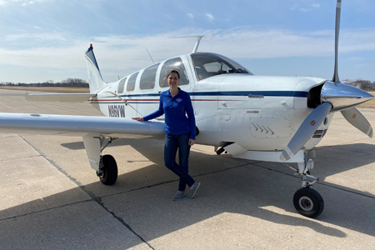Patients Get More Mileage With Free Flights To Far-Flung Clinical Trial Sites
A conversation with Lindsey Kerr, executive director, LifeLine Pilots

When you imagine someone heading to a doctor’s appointment, the scenario likely depicts a patient getting into a car, or perhaps sitting on a bus or boarding a commuter train.
But some folks begin their trek with a private pilot’s welcome.
Clinical trial participants, particularly those enrolled in studies far from their home, must fly to their clinical trial site. Costly, inconvenient, and time-consuming, this method of travel, and thus the clinical trial, are often out of reach.
For those needing to travel long distances for medical treatment, including those enrolled in clinical trials, there is another option — and it doesn’t cost a dime.
LifeLine Pilots, based in Illinois and serving 10 states in the Midwest, has been providing free flights through volunteer pilots since 1981. Today, they boast more than 350 volunteer pilots, who last year flew almost 1,000 flights for people in need of medical care far from home. These pilots will fly people from 100 to 1,000 miles, always at no cost to the passenger.
Clinical Leader heard from LifeLine Pilot Executive Director Lindsey Kerr to learn more about this vital, if not niche travel service, and the impact it can have in trial participants’ lives.
Clinical Leader: Who are some of the primary patient populations that benefit from your service?
Kerr: LifeLine Pilots flies anyone with a medical need far from home. They may be an 85-year-old with a cancer diagnosis, a 40-year-old participating in a clinical trial, or an infant traveling to specialist care hundreds of miles from home. Anyone who has a financial or medical need to use our service can fly with LifeLine Pilots. About half of our passengers are traveling for cancer treatment. Centralization of specialist cancer care means that often people have to travel hundreds of miles to get the best treatment.
Specifically looking at clinical research, how many or what percentage of your passengers are seeking transportation to participate in clinical research?
Almost half of LifeLine Pilots’ passengers are traveling for cancer treatment, including clinical trials. Cassie was a passenger we flew dozens of times from her home in Tennessee to Houston, Texas, more than 700 miles away. Cassie, only 35 years old, had already lost her mom to breast cancer and she was now facing the same diagnosis. She was enrolled in a clinical trial at MD Anderson Cancer Center, but the monthly road trips, stressful and expensive commercial flights, and time away from her husband and young son were hard on their family.
During her treatment she shared that, "LifeLine Pilots are true heroes. They take the stress out of getting to and from appointments. Oncology appointments create enough anxiety without the added financial burden and tensions of frequenting commercial flights. Thank you, LifeLine Pilots, for making this unnerving time much more bearable.”
Only 15 months after she started flying with LifeLine Pilots, Cassie passed away. What LifeLine Pilots and our volunteers were able to give Cassie were so many extra moments by making her journey a little shorter and a little easier.
Interested patients can submit a travel request via your website, as can healthcare providers. How do most patients become passengers?
It is easy to submit an application to LifeLine Pilots and click on “Flight Request Form.” The passenger, a caregiver, or a medical professional can complete the application. We will need essential information, such as the passenger’s date of birth, weight, reason for travel, and travel dates. We also will need the name and contact information of their physician to obtain a medical release.
Most passengers learn about LifeLine Pilots through word of mouth. A study by a sister volunteer pilot organization found that only about 5% of people who need charitable aviation use our services. This is because they just don’t know the service exists. We encourage everyone we talk with to share our mission with others. You never know who in your network needs transportation help for medical needs far from home.
Our vision is a world where every person has equal access to transportation for healthcare and humanitarian needs. For that to happen, more people need to know that NEMT (non-emergency medical transportation) is not just for getting across town to your doctor or hospital. It also exists to help people travel up to 1,000 miles for medical care, at no cost to the passenger.
Do you have any existing relationships with healthcare providers, such as clinical research sites?
LifeLine Pilots works with several doctors, nurses, case managers, and social workers to help patients who are traveling a long distance for medical care. Hospitals that have concierge services or transportation departments also work with our mission coordinators when a patient needs our services. We are open to working with any medical professionals, community support groups, or research organizations. Our goal is to help anyone who needs our services to access medical care.
Can you share a patient story that illustrates the importance of your work?
When 2-year-old Aiden’s parents contacted LifeLine Pilots, they desperately needed to get to a clinical trial to fight Aiden’s relapsed neuroblastoma cancer. Aiden was diagnosed with Stage 4 neuroblastoma just 11 days after his first birthday, and a year later the cancer was back.
Starting in 2020, volunteer pilots with both LifeLine Pilots and our sister organization Angel Flight East flew Aiden and his parents from their home in Indianapolis to Memorial Sloan Kettering Cancer Center in New York. This military family was trying to stay afloat with the medical bills coming in and still find the best treatment for their son.
Fast forward to today and Aiden is now 6 and has just started first grade, and in 2023 he was officially released from oncology care. Aiden has many long-term side effects from the treatment, but his mom says he is “smart as a whip and full of songs, spunk, and giggles.”
Tell us a little bit about some of your pilots. Who are they, and what are their motivations for volunteering for LifeLine Pilots?
We asked our volunteer pilots why they joined LifeLine Pilots. Pilot Michael B. from Wisconsin sums it up: “Honestly, at first I joined to find a reason to fly more. But my very first mission impacted me deeply. Especially when the patient called me right before going into surgery to tell me what that flight meant to him. Talk about something you'll never forget.”
Our pilots love to fly, and what better way to do something you love than to help people in the process? One volunteer told us he never felt like a real pilot until he flew a LifeLine Pilots passenger to treatment for the first time.
Our founder, Wanda Whitsitt, once said, “Pilots have a special skill, and my hope is that they will use this skill outside the limits of their life and make a difference in somebody else’s.”
With more than 10,000 flights for people throughout the years, her hope has been realized. Wanda passed away in 2023 at the age of 91, but her legacy lives on in the pilots who volunteer for LifeLine Pilots now and who in decades to come will still be flying passengers from home to hope.
Finally, how do you think LifeLine Pilots make a difference in patients’ lives?
Travel to medical care far away can be daunting, causing a person to delay or forego treatment. The Robert Wood Johnson Foundation published a study of the effect of transportation barriers on healthcare outcomes on April 26, 2023. It found that "transportation barriers... create access barriers to care and can be detrimental to long-term health." Statistics from the study showed that "5 percent of all U.S. adults reported foregoing healthcare due to transportation barriers."
Access to transportation is now considered a social determinant of health, along with determinants like food and housing. According to the American Hospital Association, “[Transportation] issues may result in missed or delayed healthcare appointments, increased health expenditures, and overall poorer health outcomes.”
LifeLine Pilots makes a difference by not only providing free transportation to medical care far from home but also creating a community of support around our service. Our passenger Mark and his wife said, “We would take one of our five kids each time and, throughout this cancer journey, our family was able to experience something they otherwise never would have done. Being on the plane, experiencing something new, or when we are coming home with not the best news, gives us a distraction.”
When 3-year-old Aiden was flying with us, his mom sent us this message, “Even if he does not live through all the therapies, he still had the hours of pure happiness as a 3-year-old on his private plane, among the fluffy white clouds, where cancer couldn’t touch him.”
LifeLine Pilots and our volunteers provide more than transportation; we give hope for a better and healthier tomorrow.
About The Expert:
 Lindsey Kerr is the executive director of LifeLine Pilots, a non-profit based in Illinois that serves 10 states in the Midwest. She has dedicated her professional life to the non-profit sector. In 2019, Lindsey brought her fundraising, leadership, and communication skills to LifeLine Pilots and is helping the organization expand its outreach and increase the number of people helped. Not all healthcare is close to home, which for many means they go without life-saving care. LifeLine Pilots has been advancing health equity for 43 years by addressing the transportation barrier to care. Since Lindsey joined the organization, it has grown 560%, now flying almost 1,000 flights a year. Lindsey is a fierce believer in the LifeLine Pilots vision of a world where every person has equal access to transportation for healthcare and humanitarian needs.
Lindsey Kerr is the executive director of LifeLine Pilots, a non-profit based in Illinois that serves 10 states in the Midwest. She has dedicated her professional life to the non-profit sector. In 2019, Lindsey brought her fundraising, leadership, and communication skills to LifeLine Pilots and is helping the organization expand its outreach and increase the number of people helped. Not all healthcare is close to home, which for many means they go without life-saving care. LifeLine Pilots has been advancing health equity for 43 years by addressing the transportation barrier to care. Since Lindsey joined the organization, it has grown 560%, now flying almost 1,000 flights a year. Lindsey is a fierce believer in the LifeLine Pilots vision of a world where every person has equal access to transportation for healthcare and humanitarian needs.
